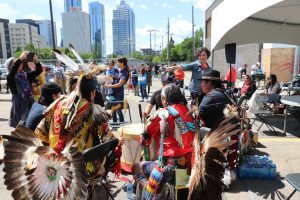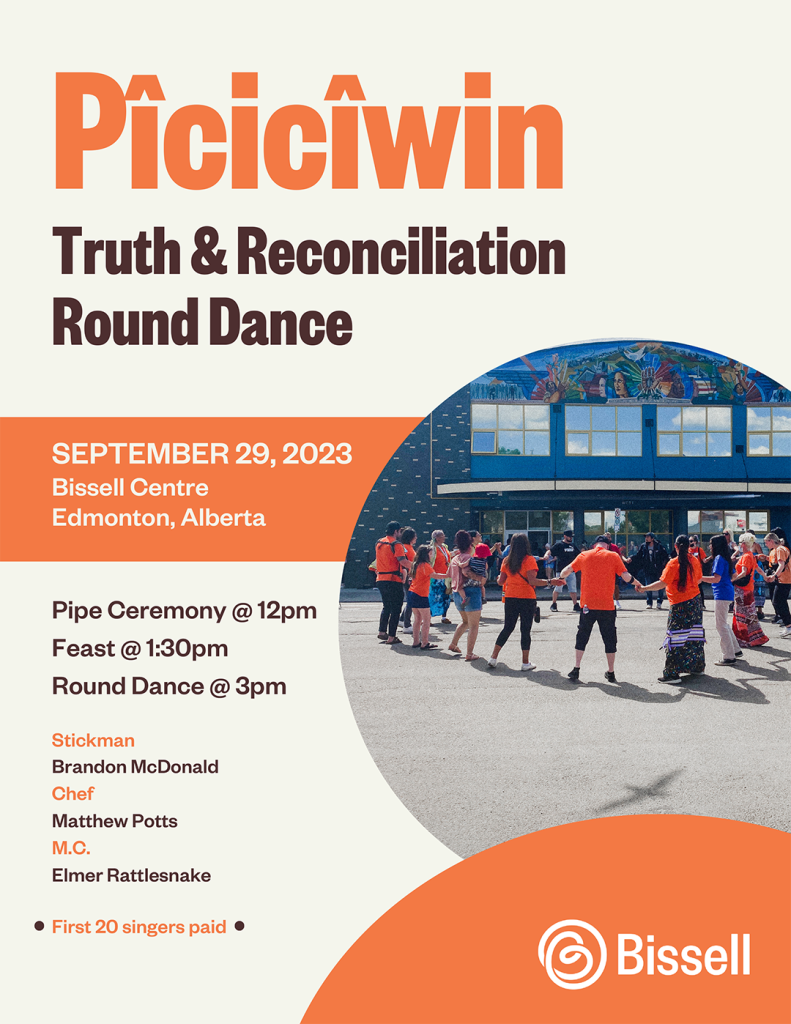The new Indigenous Engagement program is a spark of connection, igniting a deep sense of belonging through the customs that define Indigenous identities. Together, we remember the past, learn from our ancestors’ wisdom, and embrace it all with open hearts. In this shared journey, we strengthen our bonds and foster understanding.
Guided by the Seven Sacred Teachings: Love, Respect, Courage, Honesty, Wisdom, Humility, and Truth, this program serves as a bridge to Indigenous heritage and a platform for nurturing improved relationships between Indigenous and non-Indigenous communities across Canada.
Launching for National Day for Truth and Reconciliation
“Listening attentively to the voices of our community, we have crafted programs that provide opportunities to connect with Indigenous roots,” says Sarah Higgins, Director of Indigenous Engagement at Bissell Centre. “We focus on celebrating age-old traditions while exploring new ways to honour them.”
The program has been active over 2023 but is officially launching at the end of September – consciously coinciding with National Day for Truth and Reconciliation. Higgins explains how launching this new Indigenous Engagement program at the same time as this important ceremony for Indigenous communities is part of a larger reclamation of Indigenous culture and an important part of the healing that the community needs.
Reclaiming Indigenous Cultural Practices
“We have a large overrepresentation of Indigenous people accessing Bissell Centre programs,” says Higgins. “This program is a direct response to what we were hearing directly from the community. Holding our ceremonies, performing our smudges and our songs, collecting our medicines, and accessing the wisdom of our elders – these are all foundational to what we’re providing in this program.”
She goes on to point out that the ceremonies and customs practiced in the Indigenous Engagement program would have been illegal up until 1951, when the Indian Act was first amended to end its discrimination against Indigenous traditions. Higgins is proud to lead a team that ensures the customs and rituals practiced by Indigenous peoples have a home at Bissell Centre – where they can reach a lot of people who need it most.
Discover more about how the new Indigenous Engagement program by Indigenous folks, for Indigenous folks, is helping more people honour and connect to their culture.
For Sarah Higgins, Director of Indigenous Engagement at Bissell Centre, the word that comes most to mind when she thinks about National Day for Truth and Reconciliation is ceremony. She explains how every Indigenous member of Bissell Centre’s staff and community has a direct correlation to or has been directly impacted by residential schools.
“It’s a way to express our grief and heal from our losses in a healthy and enriching way,” says Higgins. Bissell Centre is holding its own National Day for Truth and Reconciliation ceremony on September 29 from noon to 9:00 p.m. and will feature a pipe ceremony, a Round Dance, and a traditional feast provided by Red Seal Indigenous Chef Matthew Potts.
A History of Indigenous Cultural Ceremonies
While Bissell Centre’s event in downtown Edmonton (10527 96 Street) is open to everyone, it’s far from a celebration. National Day for Truth and Reconciliation was born from the 94 Calls to Action from the Truth and Reconciliation Commission – and after mass graves were found at multiple sites of residential schools across the country. Cultural Support Worker Brandon Lee-McDonald explains how at one point, holding this very event would have landed everyone participating in prison.
“Up until 1951, when the Indian Act was amended, we weren’t allowed to have our drum circles, we had to change the names of our ceremonies, we essentially had to hide in the bushes to express our cultural identity,” says Lee-McDonald. “Our ancestors suffered and died so we could hold our ceremonies in public again. Without their sacrifice, we wouldn’t be able to have this ceremony in downtown Edmonton.”

What this Day Means at Bissell Centre
A tenant of the National Truth and Reconciliation event at Bissell Centre is honouring those who survived residential schools. There will be a list of survivors in attendance during the event, to recognize their resilience in the face of an atrocity that took so many.
It might look like we’re celebrating at our National Day for Truth and Reconciliation event, but we’re mourning and grieving,” says Lee-McDonald. “We’re acknowledging the survivors of residential schools and honouring them. This is our day to mourn in a healthy way from our past traumas.”
While everyone at the National Truth and Reconciliation Day event at Bissell Centre will be commemorating that they’re still here, there is still a lot of healing to be done. National Day for Truth and Reconciliation may be about grief and healing, but it’s also about empowerment and reclamation.
“This is a day given to us by the Creator,” says Lee-McDonald. “It was given to help us grieve and heal and be healthy. We want to take this day for our ceremony and live our truths in our cultural identity. It’s a big deal we can hold this ceremony on the streets of Edmonton.”

Kari’s eviction notice came swiftly. She had a month to find new accommodations for her and her adult sons with special needs. Unsure how she could find a place on such short notice, Kari considered all her options, from living in a storage unit to even living in her car. Then she remembered a community organization.
“I knew about Bissell Centre—I worked with Bissell Centre while teaching a crafting course,” Kari says. Despite her prior knowledge of the organization, Kari was surprised to learn about the Community Bridge program and how it could help her secure a new home.
As part of the Community Bridge program, Kari was given a $2,000 open-ended, interest-free loan to cover her damage deposit and rent, which she paid back proudly. “I wanted to make sure that resource was there and ready for the next person who needed help.”
A Kokum’s Giving Spirit
This giving spirit is typical for Kari – whose community frequently refers to her as the Community Kokum, or grandmother, providing love, support, and guidance whenever and wherever she can. Even when her pantry was empty and her power shut off, Kari still looked after others and considered her situation manageable.
“I’ve had to flee domestic violence,” says Kari. “While in the shelters, I saw many women in similar situations and how much worse off I could have been. I never saw myself as a victim. I have a lot of resilience that’s helped me through some tough times.”
Prior to reaching out to Community Bridge, Kari faced many uphill battles – especially when it came to where she called home. Kari has moved four times in four years through low-income housing and encountered varying levels of domestic violence and abuse. She’s also struggled with her adult children’s special needs, experienced houselessness while seven months pregnant and underwent multiple medical procedures. Kari tried to push through it without any outside help, but when she needed assistance, she knew Bissell Centre would be there with solutions. However, Kari wasn’t expecting this amount of support from Bissell Centre’s Community Bridge.
“Everything with Community Bridge was no pressure and fell into place seamlessly,” Kari explains. “It took two weeks to learn I had a loan and two weeks after that, I secured my place. I took possession of my new home before I moved out of the last place.”
How Community Bridge Helped Kari
The Community Bridge program is essential to Bissell Centre’s operations. Between April 2022 and March 2023, the Community Bridge program prevented 511 individuals from housing-loss, resulting in 214 households served, with another 202 households assisted with loans. Ensuring people don’t lose their homes and experience houselessness is the team’s top priority – so the first place they look to help folks out is with their current landlords. The team negotiates on behalf of the people they’re helping to prevent any untimely evictions.
When landlords are unable to negotiate any further and eviction is imminent, Community Bridge Support Workers then work directly with the people who need a new place to live, helping make the transition to their new place as seamless as possible.
Partners Make These Programs Possible
A program like this wouldn’t be possible without our partners in the community, like ENMAX. Their support has been crucial for Community Bridge to help people find places to call home.
And as Kari points out, it’s not just finding and funding new spaces that makes this program indispensable – it’s the regular follow-ups and wraparound services that have helped keep her and her family in their new home.
“I think more people should check out Bissell Centre to know what it has to offer,” says Kari. “Without Community Bridge, I would be experiencing houselessness. I never thought I would be in that position. Bissell Centre made sure I still had a place my sons and I could call home.”


